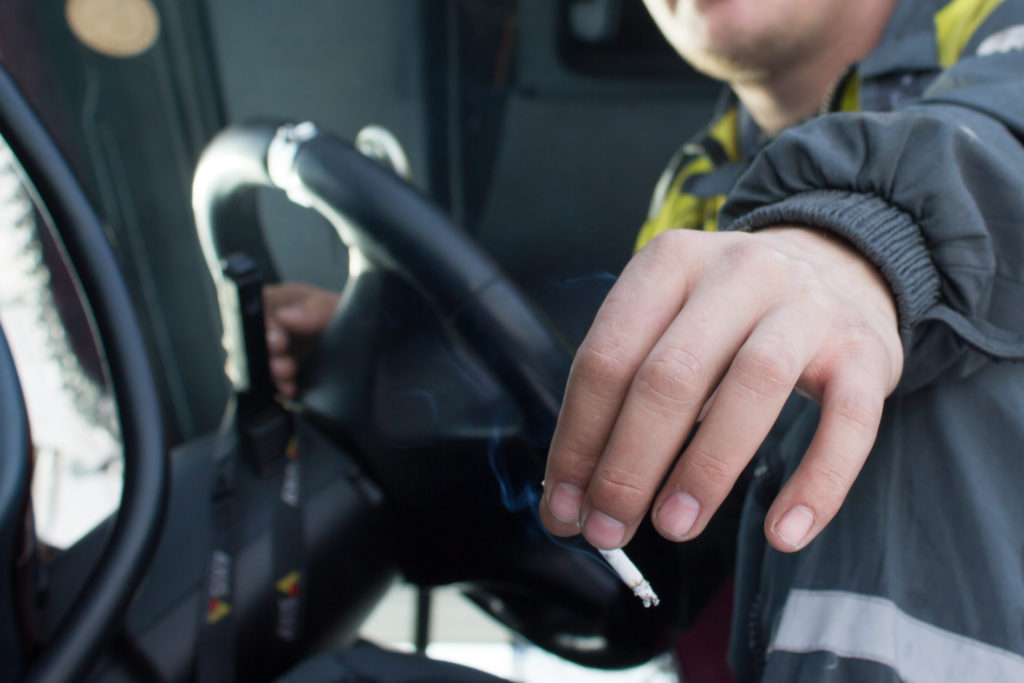
As the coronavirus pandemic continues, truckers are still at the front lines, working hard to get necessary supplies and food items to stores and families. Because of this, many groups and businesses are coming together to get face masks and hand sanitizer to as many of these truck drivers, and other essential workers, as possible.
In Portland, Oregon, Shine Distillery & Grill was worried about staying afloat when the state’s governor, Kate Brown, ordered Oregon’s bars and restaurants to cease on-site dining. Owner Jon Poteet, along with his staff of 25, decided to find a way to stay in business as well as make a difference for those working during this time of pandemic.
Shine had begun using his distillery to make, sell, and donate hand sanitizer before the shelter-in-place order was implemented. Now, Shine’s hand sanitizer, with 80% alcohol by volume, sells for $1 per ounce and is made from the alcohol he would usually use for vodka.
“We had two lines out the door, one for seating in our restaurant and the other for hand sanitizer,” Poteet said about the start of the COVID-19 era. “I realized that this was a game changer.”
So far, Shine has sold 4,000 bottles of sanitizer and has donated thousands more to individuals, essential workers, and community organizations.
“Anybody who walks in the door gets three ounces, whether they ask for it or not,” Poteet said.
Also making and distributing hand sanitizer is Protective Insurance and customer distillery Hotel Tango of Indianapolis, along with American Trucking Associations. The team effort has produced 550 gallons of hand sanitizer with 55-gallon drums being distributed to trucking companies and truck stops.
Hotel Tango, like Shine, had to close due to COVID-19 restrictions, but found a new way to channel its distillery efforts through hand sanitizer.
“We are distributing the barrels across different areas, so all truck drivers–not just ATA members–can get sanitizer,” said Elisabeth Barna, American Trucking Associations executive vice president for industry affairs. “The barrels have a pump on them, and drivers can bring their own bottles and refill them.”
This sanitizer became available in late April. Nick Ladig, chief sales officer of Hotel Tango, said the company is working to produce around 600 gallons of hand sanitizer each week.
“It was important for us to ensure that our business–which isn’t a necessity in the daily routine–could provide something for those that don’t have an option but to keep things going and moving, like the trucking and medical industry,” he explained. “They are truly essential businesses. We felt it was a duty to convert our production facility over and help with the supply. There’s a lot of stuff being moved across the country right now–they’re on the front lines.”
Additionally, many other groups within the trucking industry have come together to distribute thousands of free face masks to smaller trucking firms.
“We wanted to do something to help these smaller trucking companies,” Barna said. “The smaller carriers have been calling us, and they’re in need of masks. All of these carriers are doing a great job.”
These KN95 masks have been distributed by the ATA Litigation Center, Trucking Moves America Forward, the American Transportation Research Institute, and the Trucking Cares Foundation. The groups recently distributed 4,000 of these face masks to small firms, an effort that is part of a shipment of 50,000 masks procured by ATA. The rest of the masks will be sold to trucking companies at cost, in packages of 100.
Because of high demand, another 50,000 masks were ordered shortly after the first order.
“These are critical supplies, and more drivers are wearing and needing masks,” Barna said. “We know a lot of companies are scrambling to get personal protective equipment to their drivers. This will help. We’ve had a lot of people ordering them, from 200 to 10,000.”
Dan Horvath, ATA Vice President for Safety Policy, explained that these masks will help industry workers continue their duties, especially in states that have required everyone to wear face coverings in public.
“A lot of these state regulations that are coming into place, or county jurisdictions, are requiring face coverings,”said Horvath. “While these masks are not a foolproof way to keep the driver from getting sick, or infecting someone else, they are at least complying with the new rules coming up concerning face coverings.”

